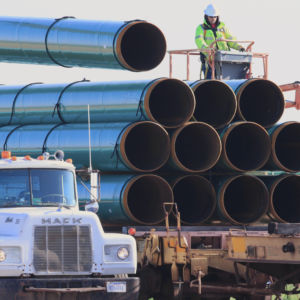With the stroke of a pen, President Donald Trump ordered federal agencies, including the Army Corps of Engineers, to “review and approve in an expedited manner” requests for approval to finish construction of the Dakota Access Pipeline. This likely signaled an end to months of protesting. Although opponents of the project vowed to continue their resistance, a recently released document from the Army Corps of Engineers shows that the protests face long odds.
In a December 3, 2016 memo, U.S. Army Corps Col. John Henderson outlined the process by which the Corps determined the environmental impact of the pipeline on Lake Oahe. The memo also lays out the legal arguments supporting its approval and construction, specifically countering several of the protesters’ concerns, including water safety and tribal rights. Henderson concludes by recommending that the easement be granted.
“Corps policy is to grant an easement when it is in the public interest,” wrote Henderson. He further explained that granting the easement would not interfere with the operation of the Corps dam near Lake Oahe and that the proposed pipeline met necessary safety requirements.
According to the memo, construction of the pipeline would in fact improve safety, by shifting oil transportation away from truck and rail.
“The overall pipeline project will improve overall safety to the public and to the environment by reducing crude oil shipped by truck and by rail,” Henderson wrote.
Henderson also rebutted the argument that the company constructing the pipeline had not fulfilled its legal requirements to coordinate construction plans with the Standing Rock tribe.
“The proposed DAPL crossing at Lake Oahe is not on reservation lands; therefore, by policy, there is no requirement to coordinate with any federally-recognized tribe,” he wrote. Despite this policy, the Corps attempted to work with the tribe in excess of what was legally required.
Henderson’s memo explains that the project once again met legal requirements to gain the easement necessary to finish construction and implies that the project was slated for approval towards the end of the year. Instead, then-Assistant Secretary of the Army Jo Ellen Darcy announced an additional environmental impact study in order to further delay construction.
Supporters of construction believe that the memo points to political stonewalling of the project.
“This memo demonstrates that the Army Corps of Engineers worked diligently – and in accordance with the law – to ensure the Dakota Access Pipeline was sited and constructed in the most environmentally and culturally sensitive manner possible; and that the Corps, in its authority was about to issue the final easement for Lake Oahe,” said Craig Stevens, spokesman for the MAIN Coalition, which supports new infrastructure development.
“It’s now clear and certainly unfortunate that former assistant secretary of the Army, Jo Ellen Darcy, and other appointees in the Obama administration blocked the Corps’ work purely for political reasons,” he continued. “We’re pleased that President Trump is clearing the way for this and other important energy infrastructure projects to move forward.”

